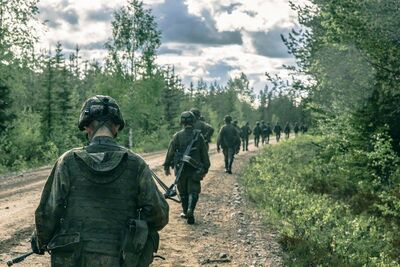Ruvelkan Autumn Counter-Offensive: Difference between revisions
(Created page with "{{Infobox military conflict | conflict = Ruvelkan Autumn Counter-Offensive | width = | partof = | image = 400px | im...") |
No edit summary |
||
| Line 55: | Line 55: | ||
==Impact== | ==Impact== | ||
[[Category:Syara]] [[Category:Ruvelka]] | [[Category:Syara]][[Category:Ruvelka]][[Category:Battles of the Zemplen War]] | ||
Revision as of 23:59, 27 October 2020
The Ruvelkan Autumn Counter-Offensive was a series of strategic offensives launched by Ruvelka in the fall of 2009 during the Zemplen War. The offensives began on with Operation Hretha (16 September - 2 October 2009) and Operation Overshadow (16 September - 7 October) followed by Operation Balaton (22 September - 19 October). The Ruvelkans hoped to mitigate and roll back the gains the Syarans had made during their spring offensive.
After suffering 700,000 casualties between April and June, the Imperial General Staff of the Imperial Armed Forces of Ruvelka were convinced of the necessity of suspending operations until the Ruvelkan military had been replenished, but Debrecen argued a counter-offensive was necessary to forestall future Syaran offensives. It was ultimately agreed to launch a series of three main offensives in the norther, center, and south. Each of the operations was designed to destroy a significant amount of mechanized and armored forces of the Syaran army groups, and thus were directed against specific Syaran field armies. The Ruvelkans began their offensive on 16 September and declared the counter-offensive over on 19 October.
The outcome and impact of the offensive remains a topic of discussion to current day. The Ruvelkans fell short of their operational goals; in the south Syaran forces simply ceded ground rather than commit to a pitched battle, and in the center and north Syaran forces contested and halted the Ruvelkan advance, and in some cases launched significant counterstrokes. Ruvelkan casualties surpassed 200,000, and brought their total casualties from April to October to over 900,000 killed, wounded, missing, or captured. Nevertheless some analysts consider the counter-offensive a strategic succes, as the Syaran Commonality Armed Forces suffered a total of 535,277 casualties during the same time frame, and unlike Ruvelka could not replenish their losses quickly. After six months of intense combat the SCAF Central Command suspended all strategic offensive operations, while the Ruvelkan armed forces began rebuilding their formations in preparation for another attack.
